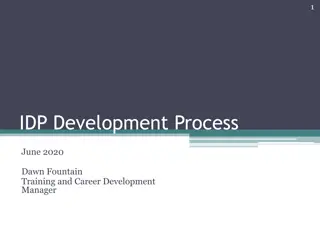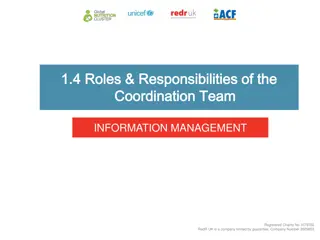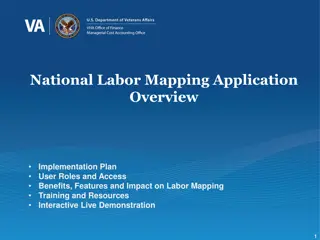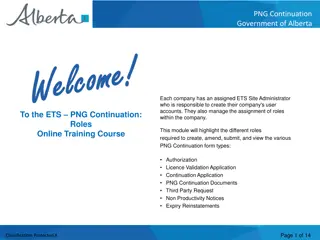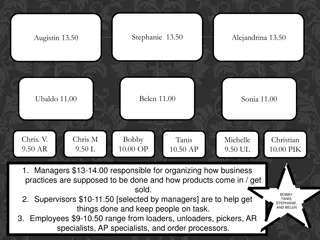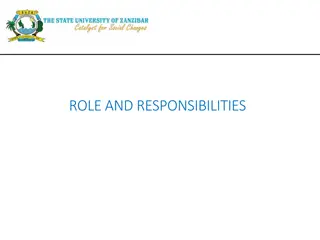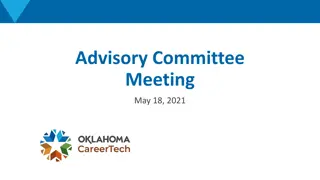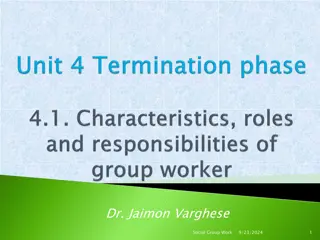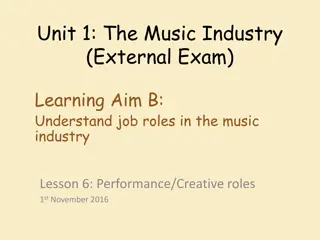
Key Roles in Company Management and Operations
Discover the responsibilities of Managing Directors, Contracts Managers, Production Planners, Estimators, and Construction Buyers in overseeing company operations, contracts, production logistics, cost estimation, and material procurement. Learn about their crucial roles in strategic planning, contract negotiations, supply chain management, and ensuring project profitability.
Uploaded on | 1 Views
Download Presentation

Please find below an Image/Link to download the presentation.
The content on the website is provided AS IS for your information and personal use only. It may not be sold, licensed, or shared on other websites without obtaining consent from the author. If you encounter any issues during the download, it is possible that the publisher has removed the file from their server.
You are allowed to download the files provided on this website for personal or commercial use, subject to the condition that they are used lawfully. All files are the property of their respective owners.
The content on the website is provided AS IS for your information and personal use only. It may not be sold, licensed, or shared on other websites without obtaining consent from the author.
E N D
Presentation Transcript
M D As the managing director of a company, you're the head honcho. You're the one that's in charge of the whole company, from the day to day stuff to the really big picture problems. You'll be held accountable when things go right but also when they go wrong. Successfully implementing company policy Developing strategic plans Maintaining a dialogue between shareholders and the board Controlling finance Building and maintaining an effective management team Assuming full accountability for the board for all company operations
CM Contracts Managers work closely with and support Contracts Directors. They sometimes handle the direct management of Contract staff and they delegate assignments. They also assist marketing and sales teams, often giving them guidance and support. These professionals oversee contracts and forms, revising and ensuring all verbiage and statements are correct. A Contracts Manager usually performs many of the following tasks: Liaising with customers Preparing monthly reports Negotiating contracts Managing tenders Monitoring changes or developments within the industry Evaluating customer needs Training staff Conducting employee appraisals
Planner Production planners, also known as production schedulers, managers, controllers and coordinators, are involved in the logistics of supply chain management. Most of their time is spent on business and organizational aspects of producing and distributing products. Duties Production planners are in charge of organizing paperwork, such as purchase orders and delivery schedules review orders. Most tasks involve keeping and updating records and information, as well as coordinating purchasing with clients and co-workers. It is the job of the production planner to ensure smooth operations throughout the production and distribution life of a given product.
Estimator Estimators work out how much it is going to cost to supply products and services to their clients. As an estimator or cost engineer, your job would be to work out how much it costs to supply products or services to a client. Normally working for a manufacturing, engineering or construction company, you could produce estimates for a wide range of products or services. finding out what the client wants researching materials, equipment and labour costs collecting quotes from materials suppliers and sub-contractors planning job timescales assessing the levels of risk on a project analysing company data, exchange rates and prices, using software packages preparing and submitting quotations for work helping with bids for new contracts and supporting buying activities monitoring the stages of a project to make sure that costs are kept in line with forecasts.
Buyer Construction buyers are the regulators for the materials required for a construction project, in which they purchase the products in accordance with the established budgets. Buyers are crucial in ensuring that the construction contract maintains profitable, and that the most cost effective materials are used to lower outlays. In the construction industry construction buyers play a key role in the overall profitability of a project, due to fluctuations in the cost of raw materials required. A construction buyer will seek quotes on prices and availability of materials from a variety of suppliers, and manage and report on the accumulative cost of all new purchases. Also required of a buyer is the ensuring that all materials comply with health and safety guidelines, and that the project estimator is fully briefed on the cost of materials.
Whos Involved ? Site Operatives Crafts persons Supervisors Craft Foreman General Forman Site manager Contractors Manager Quantity Surveyor The Purchasing Manager Health and Safety Inspector Contractor Sub-Contractor
Operatives To be a construction operative or site labourer, you will have to have a good level of fitness. You will need to have basic knowledge of building methods and materials. You will also need a good head for heights. Ground working marking out and digging shallow trenches for foundations and drains Form working putting up or dismantling the shuttering that holds setting concrete in place Steel fixing bending and fixing the bars used to reinforce concrete structures Steel piling fixing steel sheets together to form temporary retaining walls for excavation work Concreting layering and smoothing concrete for foundations, floors and beams Road working concreting, laying kerbs, paving and re-surfacing.
Crafts Person Brick layers - Bricklayers build and repair walls, chimney stacks, tunnel linings and decorative stonework. They might also refurbish brickwork and masonry on restoration projects. Carpenters/ Joiners - Carpenters and joiners make and install wooden fixtures and fittings. They can work in many areas, for instance on construction sites, fitting out shops and bars, and building sets for film and TV. Plasterers - As a plasterer, you apply different kinds of plaster to internal walls and ceilings so that they are ready for decorating. You could also cover outside walls with coatings, such as sand and cement render or pebble-dash. Painter and decorator - Painters and decorators use a range of coverings to enhance and protect surfaces. These surfaces could include plaster, metal and wood.
Supervisor Construction supervisors have many responsibilities. They are in charge of the labourers who are working at a construction site. Supervisors also are in contact with the project manager and are responsible for communication between the manager and the work crew. A construction supervisor is usually highly educated and experienced in construction. The supervisor ensures that workers arrive on time, work as they are supposed to, and do not cause problems. The supervisor checks the quality of the work that is being done and ensures that everything is up to code. Supervisors also are in charge of ensuring that the workers do their jobs efficiently enough to bring the project to completion on time and within budget, but supervisors typically do not have to do manual labour themselves.
Craft Foreman A craft foreman is trade specific and will advise and remind the site manager that the need of resources and materials for that precipice job. As he will have to make sure the right materials and tools are there and there is enough people to do the job. He is also in charge of telling the site manager when they are running out of materials and that they need to order more materials to finish the job.
General Foreman A Foreman is an employee of a company who is assigned the responsibility of overseeing others to ensure that work is done correctly. The Foreman is given limited authority by management. The Foremen reports to his direct supervisor within a company, and he discusses the efficiency and failings of individuals under him.
Site Manager In the construction industry a site manager are responsible for the day to day on site and running of a construction project. Site managers site managers are required to keep with in the timescale and budget of the project. Many site managers will be involved before the site activity takes place and are responsible for managing communications between all parties involved in the on-site development of the project. Also site managers are often required to deal with inquiries and communication with the public.
Contractor Manager Construction contracts managers help to win building contracts. They also help to control costs and keep construction projects on track. As a construction contracts manager, you might be responsible for a single large contract or a number of smaller ones. You would also be the main point of contracts for clients, site managers and building contractors throughout the project. Your main responsibilities would be to: Meet with the clients to understand what they want Put plans together and estimate the budget and timescale for the project. Prepare and present the documents for tenders. Contribute to work planning, and brief project teams, contractors and suppliers Agree to any extra work to be done within set timescales. Gather all information together for invoicing at the end of the project. Supply information to resolve disputes if they arise Identify areas for improvement in existing contracting processes
Quantity Surveyor As a quantity surveyor you would play a key role in a building project, managing the costs from the early design plans, through to the building's completion. You would make sure that projects meet legal and quality standards, and that clients get good value for their money.
The Purchasing Manager A Purchasing Manager is an employee within a company, business or other organization who is responsible at some level for buying or approving the acquisition of goods and services needed by the company. The position responsibilities may be the same as that of a buyer or purchasing agent, or may include wider supervisory or managerial responsibilities. A Purchasing Manager may oversee the acquisition of materials needed for production, general supplies for offices and facilities, equipment, or construction contracts.
Health and Safety Inspector Health and safety inspectors work to protect people's health and safety by making sure that risks in the workplace are properly controlled. They ensure employers comply with all aspects of health and safety laws and that workplaces are not the cause of ill health, injury or even death.
Contractor The general contractor is a manager and possibly a tradesman, employed by the client on the advice of the architect, engineer. A general contractor is responsible for the overall coordination of a project. A general contractor must first assess the project-specific documents. In the case of renovations, a site visit is required to get a better understanding of the project. Depending on the project delivery method, the contractor will submit a fixed price proposal or bid, cost plus price or an estimate. The general contractor considers the cost of home office overhead, general conditions, materials and equipment as well as the cost of labour to provide the owner with a price for the project.
Sub-Contractor A subcontractor is a person who is hired by a general contractor to perform a specific task as part of the overall project and is normally paid for services provided to the project by the originating general contractor. While the most common concept of a subcontractor is in building works and civil engineering.




